Murder Of Iranian Director Sparks Outcry
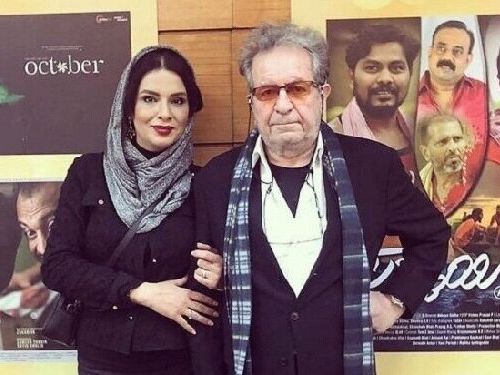
The brutal murders of renowned Iranian filmmaker Dariush Mehrjui and his wife Vahideh Mohammadifar has ignited a wave of condemnation of the country's dire security situation.

The brutal murders of renowned Iranian filmmaker Dariush Mehrjui and his wife Vahideh Mohammadifar has ignited a wave of condemnation of the country's dire security situation.
Prominent lawyer and rights defendant Nasrin Sotoudeh raised questions about the potential political motive behind the murder, calling for a referendum to establish a stable government. Mehrjui was notorious for his anti-regime views with suspicions laying at the door of the regime's own security apparatus.
She pointed out that no matter who the culprits, the current government appears incapable of ensuring its citizens' security.
According to Faraz Daily news website, the perpetrators cut the throats of the pair and broke their arms and legs. Mehrjui’s head was clobbered with a blunt object and his wife was almost beheaded.
Rasoul Sadr-Ameli, the spokesperson for the House of Cinema, declared a three-day period of public mourning starting from Monday to pay respects to Mehrjui. Additionally, all film projects across the nation are slated to be suspended for a day during the funeral procession for the revered director.
Renowned international actress and political activist, Golshifteh Farahani, directed a message to the Iranian authorities, referring to the punishment many have faced for speaking out against the regime over the years and the mass censorship which has only deepened since the Women, Life, Freedom protests. "How much do you torment Iranian artists," she said.
Haniyeh Tavassoli, a well-known actress who was detained during the 2021 protests, expressed her anguish with a poignant statement: "We are unfortunate. That's it. No further explanation is needed."
President Ebrahim Raisi claims to have directed a full investigation with reports indicating that seven suspects have been apprehended in connection with the murder so far.
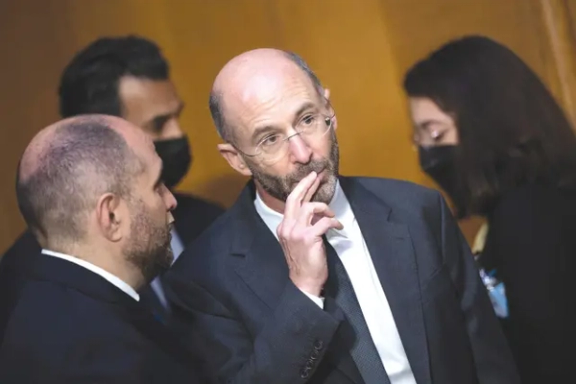
The US House Oversight Committee plans to subpoena Robert Malley, the suspended special envoy to Iran, as part of its investigation into US policies towards Iran.
According to senior committee aides speaking to Semafor website, the committee alleges that the government has obstructed Congress's repeated attempts to uncover the reasons behind the revocation of Malley's security clearance by US Diplomatic Security in April, which occurred two months prior to him being placed on unpaid leave.
Subsequently, US officials have informed Semafor that the FBI is conducting an investigation into Malley for the suspected mishandling of classified information.
The question is now to understand the truth surrounding Malley’s departure and his role in shaping overall Iran policy in addition to his involvement in negotiating the release of frozen Iranian oil revenues.
The committee is also seeking information about Ariane Tabatabai's security clearance and her involvement in the Iran Experts Initiative, a program that aimed to promote Iran's views on the nuclear negotiations. She serves as the Chief of Staff for the Assistant Secretary of Defense for Special Operations and Low Intensity Conflict (SOLIC).
Congress seeks to understand how these individuals influenced US policies towards Iran, and their support for engaging the Iranian regime. Malley and Tabatabai have defended their involvement in the Iran Experts Initiative, while the International Crisis Group, Malley's former employer, disputes allegations that it was controlled by Tehran.
Concerns about the Biden administration's Iran policy have escalated following Hamas' attack on Israel and speculation about Iran's role in the war.
While Iranian officials have welcomed Hamas' Operation Al Aqsa Flood, which has seen the death of at least 1,500, thousands more injured and 199 people from dozens of nationalities taken hostage, Iran has denied direct involvement. However, as part of its proxy network, it funds Hamas around $100m a year and offers military and logistical support.
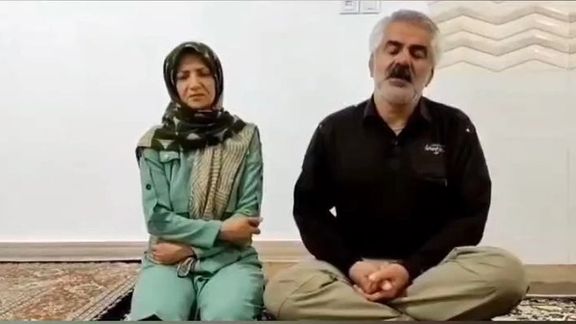
Mashallah Karami, the father of Mohammad Mehdi Karami, an Iranian protester who was executed, has been in detention for more than 50 days with no news on the charges against him.
The Iranian judiciary has refrained from issuing any official statements regarding the reasons behind his arrest. Unofficial reports suggest that Amir Hossein Kouhkan, the attorney representing the Karami family, was detained alongside him, exposed to harsh conditions, and even contemplated self-harm while in custody.
In recent days, social media users have rallied around the hashtag #MashallahKarami to shed light on his unjust detention. Legal professionals have also voiced their concerns regarding Kouhkan's arrest.
Siyamak Azami, the brother of Sepehr Azami, one of the protesters who lost their lives during the nationwide demonstrations in 2021, took to the social media platform X to disclose that both Mashallah Karami and Kouhkan are being held "in a cramped eight-square-meter cell," facing "multiple charges."
Azami further revealed that the Karaj prosecutor suggested they remain in solitary confinement until they admit guilt, fueling concerns they, like so many others, will be driven to forced confessions on trumped up charges.
The legal organization Dadban, which provides legal assistance to families of protesters and detainees in Iran, released a video featuring Karami at his son's gravesite, writing, "His crime was advocating for justice and visiting his son's grave."
Mashallah Karami was arrested in August when forces raided his home. He and several other family members were arrested as well as having confiscated all their electronic devices, including laptops and mobile phones.
Mohammad Mehdi Karami was executed on January 7, along with protester Mohammad Hosseini for participating in protests and allegedly being involved in the killing of Ruhollah Ajamian, a Basij member present at the 40th-day memorial ceremony for Hadis Najafi, another victim of anti-regime protests in Karaj.
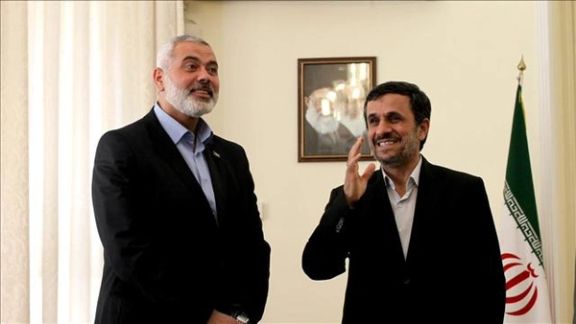
Some officials, including former President Mahmoud Ahmadinejad, are seemingly pressured in Iran to echo Ali Khamenei's support and praise for Hamas' attack on Israel.
Faraz Daily, an online newspaper reminded readers that Ahmadinejad used to deny the Holocaust and asked why he has been "silent in the face of Israel's crimes in Gaza" more than one week after Hamas's bloody attack.
The former president was in Guatemala during the past week to take part in a conference about water resources. However, he came back to Tehran on Saturday evening. Faraz Daily asked whether Ahmadinejad is afraid of taking an anti-Israeli stance under current circumstances, or he does not want to harm his popularity ahead of the upcoming parliamentary elections.
The reason for Ahmadinejad and others, including former hardline nuclear negotiator Saeed Jalili and their like-minded ultraconservatives in the Paydari Party, who have been criticized by the publication, is that these political figures may only echo Khamenei's praise and support for Hamas's atrocity and come under pressure from the Iranian public opinion that overwhelmingly supports Israel as it is evident from their social media posts, or risk being demonized and even prosecuted by Khamenei's hardline supporters.
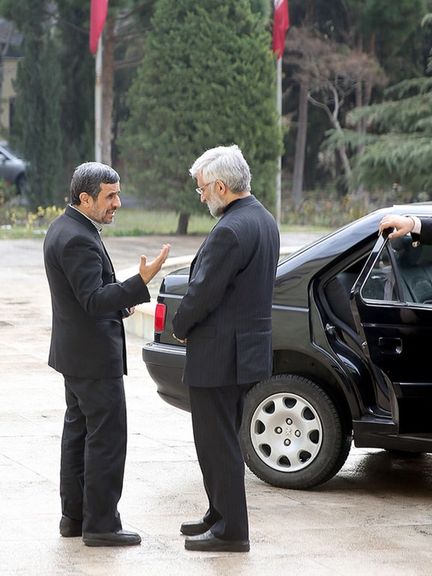
The reason Ahmadinejad, along with others like former hardline nuclear negotiator Saeed Jalili and their fellow ultraconservatives in the Paydari Party, have avoided to speak out is because if they do, they would be compelled to echo Khamenei's praise and support for Hamas's actions. However, the Iranian public opinion largely supports Israel, and they are caught between a rock and a hard place.
During the past week, former Reformist President Mohammad Khatami and former Foreign Minister Javad Zarif in social media posts and press interviews supported Khamenei's positions and immediately came under fire by the public for sympathizing with Hamas.
However, Faraz daily noted that although the state television in Iran, which is the closest media outlet to Khamenei, reflected Khatami and Zarif's opinions about Hamas, it continued its usual criticism of both Reformist figures. Khamenei’s hardliner loyalists do not miss an opportunity to attack anyone who might be slightly independent of the ruler’s rhetoric and confrontational policies.
The media coverage of Ahmadinejad and Jalili's silence may be an attempt by Iran's hardliners to pressure them and their like-minded politicians into expressing support for Khamenei. Since the 2022 protests, political backing for Khamenei has mainly come from staunch hardliners who support him, expecting his favor in return.
Former Parliament Speaker Ali Larijani also attempted to remain non-committal. He posted a typically equivocal tweet that was apparently about the war in Israel but didn't explicitly express support for Khamenei pro-Hamas rhetoric. Later, he deleted the tweet and shared an audio message on X, which was equally vague and did not provide the clear support for Khamenei that hardliners desired.
Centrist daily Sazandegi on Saturday criticized Ahmadinejad and Jalili as well Iranian Nobel laureates Shirin Ebadi (2003) and Narges Mohammadi (2023) for their silence about Gaza. However, the daily did not say why the members of Executives of Sazandegi Party, to which the newspaper belongs, have not been openly taking a stance on the Gaza war and why those mentioned in the article need to rush to express their opinion.
The purpose of the newspaper for attacking these individuals was possibly to show its loyalty to Khamenei in a bid to secure his approval for the candidacy of its affiliated party members in the upcoming March parliamentary elections.
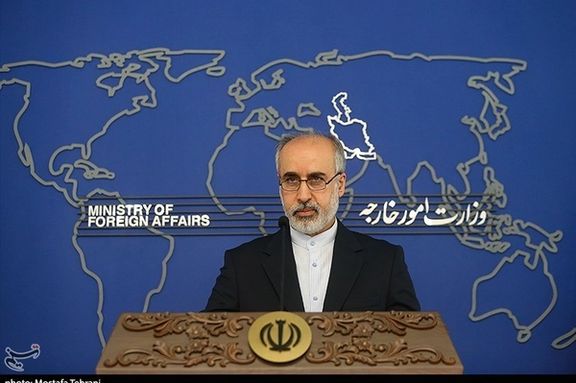
As Israel confirmed that 199 hostages are held in Gaza, Iran's Foreign Ministry claims that its proxy Hamas has expressed readiness to release civilian detainees.
In a Monday press conference, spokesperson for the Ministry of Foreign Affairs Naser Kanaani said, "The Palestinian resistance movement has informed us they are prepared to take necessary actions for the liberation of prisoners and non-military detainees they hold." Kanaani also emphasized the need for “specific prerequisites” to be met for this to become a reality.
There has been no announcement on this through official Hamas channels as yet, while countries including Qatar, Egypt and the US work to release the hostages, dozens of whom are from countries from Europe to north and south America.
While Israel prepares for a ground operation in Gaza, Kanaani used the press conference as a chance to legitimize the escalation of the conflict which began on October 7, when Hamas invaded Israel by land, sea and air, and massacred at least 1,400 people, including roughly 300 soldiers, with numbers rising.
Holding up posters related to the recent bombings in Gaza, Kanaani threatened that the continued path of conflict could "escalate the situation out of control, leading to a range of possibilities," insinuating its biggest proxy, Hezbollah, will get involved from Israel's northern front.
When questioned about whether Iran might directly intervene in the conflict, Kanaani did not provide a clear response. Instead, he referred to the capabilities of Hamas in self-defense and stated, "Hamas is capable in this domain, which is why the Zionist regime has avoided direct confrontation with resistance groups and has drawn the conflicts into non-military areas."
Hamas receives around $100m from Iran each year in addition to military support and training.
Top echelons of the regime continue to push for action against Israel. Ali Akbar Velayati, an advisor to Supreme Leader Ali Khamenei on international affairs, met with a representative of Hamas in Tehran on Monday. He stated, "You should move forward with all your might."
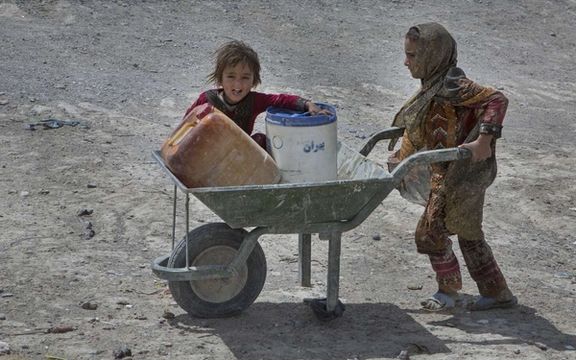
An Iranian citizen from the Sistan and Baluchestan province, one of the country's most economically challenged regions, has taken to social media to slam President Joe Biden’s deal with Iran.
In the video message, he criticizes the release of millions of dollars to the regime and points to dire living conditions within the country. All this, while tens of billions of dollars annually are invested in the country's proxies around the region.
The Iranian, who keeps his identity hidden, showcases his daily meal, a simple mixture of tomatoes and cucumbers, to underscore the stark realities of poverty in his homeland. He highlights the pervasiveness of poverty and corruption in Iran, drawing parallels between the situation in his region and the struggles faced by the people of Gaza.
"Mr. Biden, you released the money, but the money does not reach the poor people, and it goes to a place where every minute someone is killed, and a child is orphaned," he remarks, referencing the ongoing conflict between Iran-backed Hamas, and Israel.
He goes on to implore President Biden to extend assistance to the impoverished residents of Baluchestan, who, according to him, must undertake arduous journeys covering hundreds of kilometers to access even basic healthcare, incurring significant expenses in the process.
The release of $6 billion in Iranian oil revenues by the Biden administration last month as part of a deal to secure the freedom of five American hostages has been met with increasing controversy. The deal faced early objections in Washington, but the situation took a different turn following the Hamas-Israel conflict, resulting in the loss of hundreds of lives.
In the aftermath of the attack, Republican lawmakers intensified their efforts to hold the administration accountable for the move urging Biden to refreeze the money.
Currently the official annual inflation rate is around 50 percent, the highest for more than 30 years with basics such as rent and food, now unaffordable to millions of Iranians thrust below the poverty line.